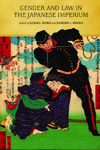Please use this identifier to cite or link to this item:
http://lib.hpu.edu.vn/handle/123456789/25354Full metadata record
| DC Field | Value | Language |
|---|---|---|
| dc.contributor.author | Burns, Susan L. | en_US |
| dc.contributor.author | Brooks, Barbara J. | en_US |
| dc.date.accessioned | 2017-06-16T01:36:06Z | |
| dc.date.available | 2017-06-16T01:36:06Z | |
| dc.date.issued | 2013 | en_US |
| dc.identifier.isbn | 9780824837150 | en_US |
| dc.identifier.other | HPU5160041 | en_US |
| dc.identifier.uri | https://lib.hpu.edu.vn/handle/123456789/25354 | - |
| dc.description.abstract | Beginning in the nineteenth century, law as practice, discourse, and ideology became a powerful means of reordering gender relations in modern nation-states and their colonies around the world. This volume puts developments in Japan and its empire in dialogue with this global phenomenon. Arguing against the popular stereotype of Japan as a non-litigious society, an international group of contributors from Japan, Taiwan, Germany, and the U.S., explores how in Japan and its colonies, as elsewhere in the modern world, law became a fundamental means of creating and regulating gendered subjects and social norms in the period from the 1870s to the 1950s. Rather than viewing legal discourse and the courts merely as technologies of state control, the authors suggest that they were subject to negotiation, interpretation, and contestation at every level of their formulation and deployment. With this as a shared starting point, they explore key issues such reproductive and human rights, sexuality, prostitution, gender and criminality, and the formation of the modern conceptions of family and conjugality, and use these issues to complicate our understanding of the impact of civil, criminal, and administrative laws upon the lives of both Japanese citizens and colonial subjects. The result is a powerful rethinking of not only gender and law, but also the relationships between the state and civil society, the metropole and the colonies, and Japan and the West. Collectively, the essays offer a new framework for the history of gender in modern Japan and revise our understanding of both law and gender in an era shaped by modernization, nation and empire-building, war, occupation, and decolonization. With its broad chronological time span and compelling and yet accessible writing, Gender and Law in the Japanese Imperium will be a powerful addition to any course on modern Japanese history and of interest to readers concerned with gender, society, and law in other parts of the world. | en_US |
| dc.format.extent | 314 p. | en_US |
| dc.format.mimetype | application/pdf | en_US |
| dc.language.iso | en | en_US |
| dc.publisher | University of Hawaii Press | en_US |
| dc.subject | Gender | en_US |
| dc.subject | Law | en_US |
| dc.subject | Japanese Imperium | en_US |
| dc.title | Gender and Law in the Japanese Imperium | en_US |
| dc.type | Book | en_US |
| dc.size | 1,564Kb | en_US |
| dc.department | Sociology | en_US |
| Appears in Collections: | Sociology | |
Files in This Item:
| File | Description | Size | Format | |
|---|---|---|---|---|
| 41_Gender_and_Law.pdf Restricted Access | 1.56 MB | Adobe PDF |  View/Open Request a copy |
Items in DSpace are protected by copyright, with all rights reserved, unless otherwise indicated.
